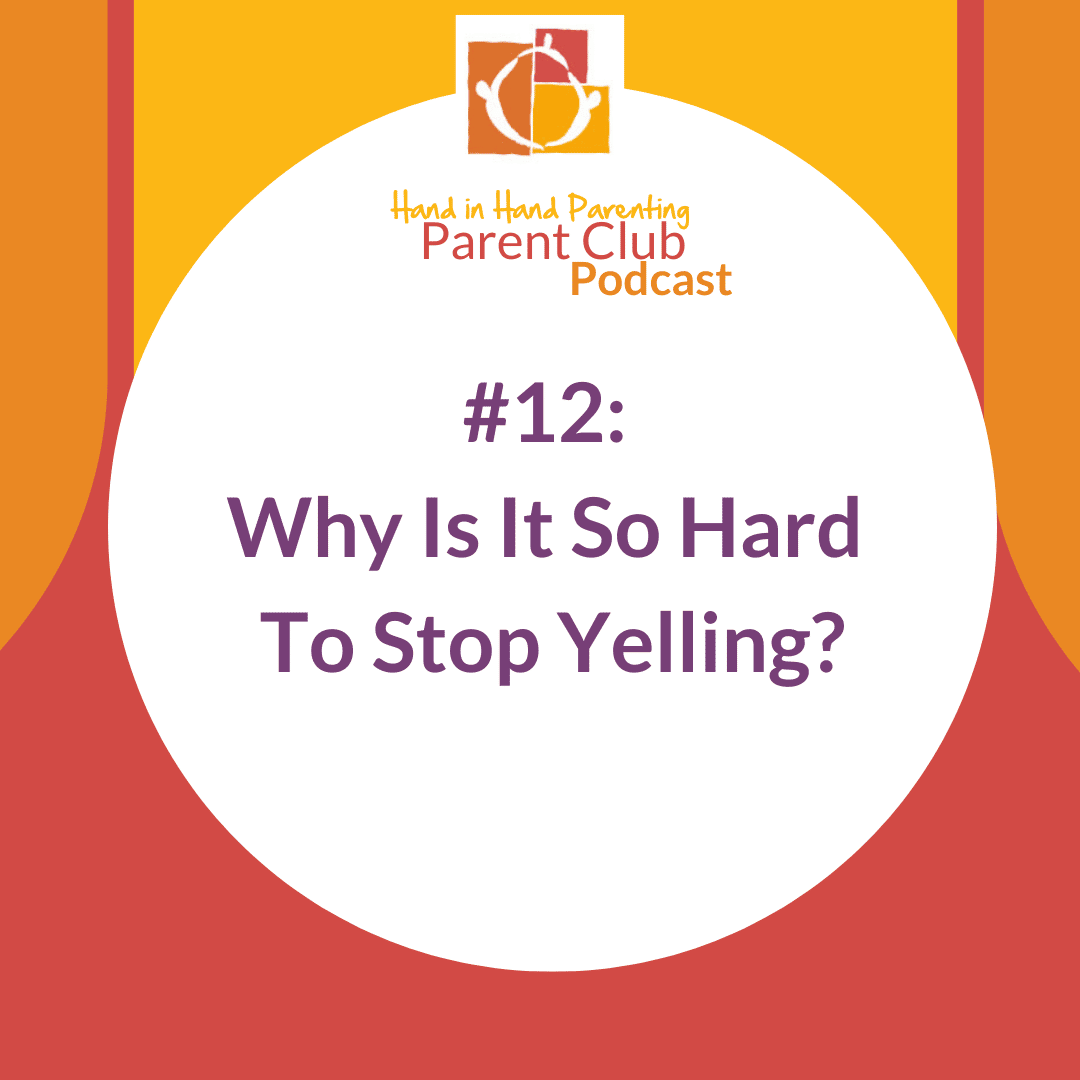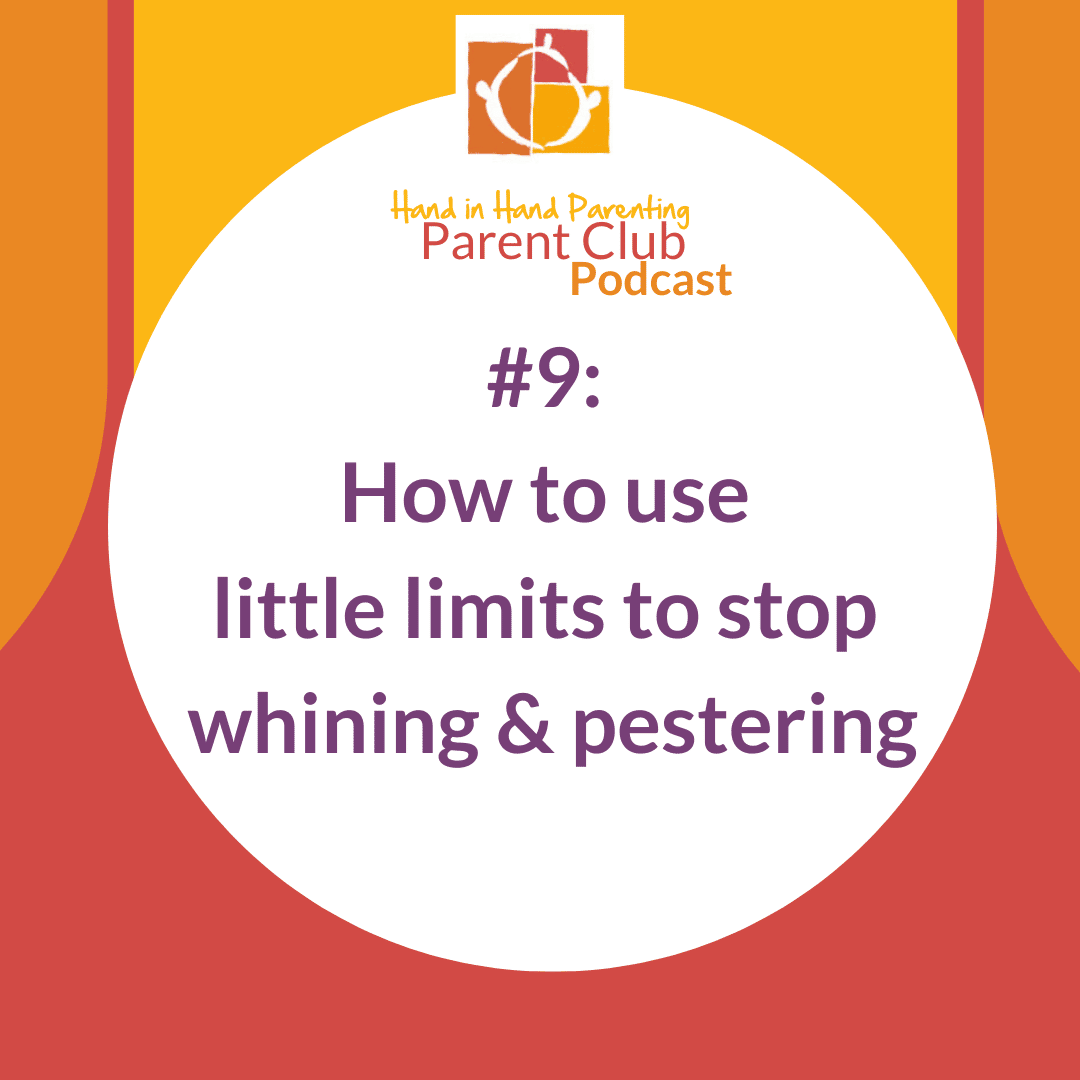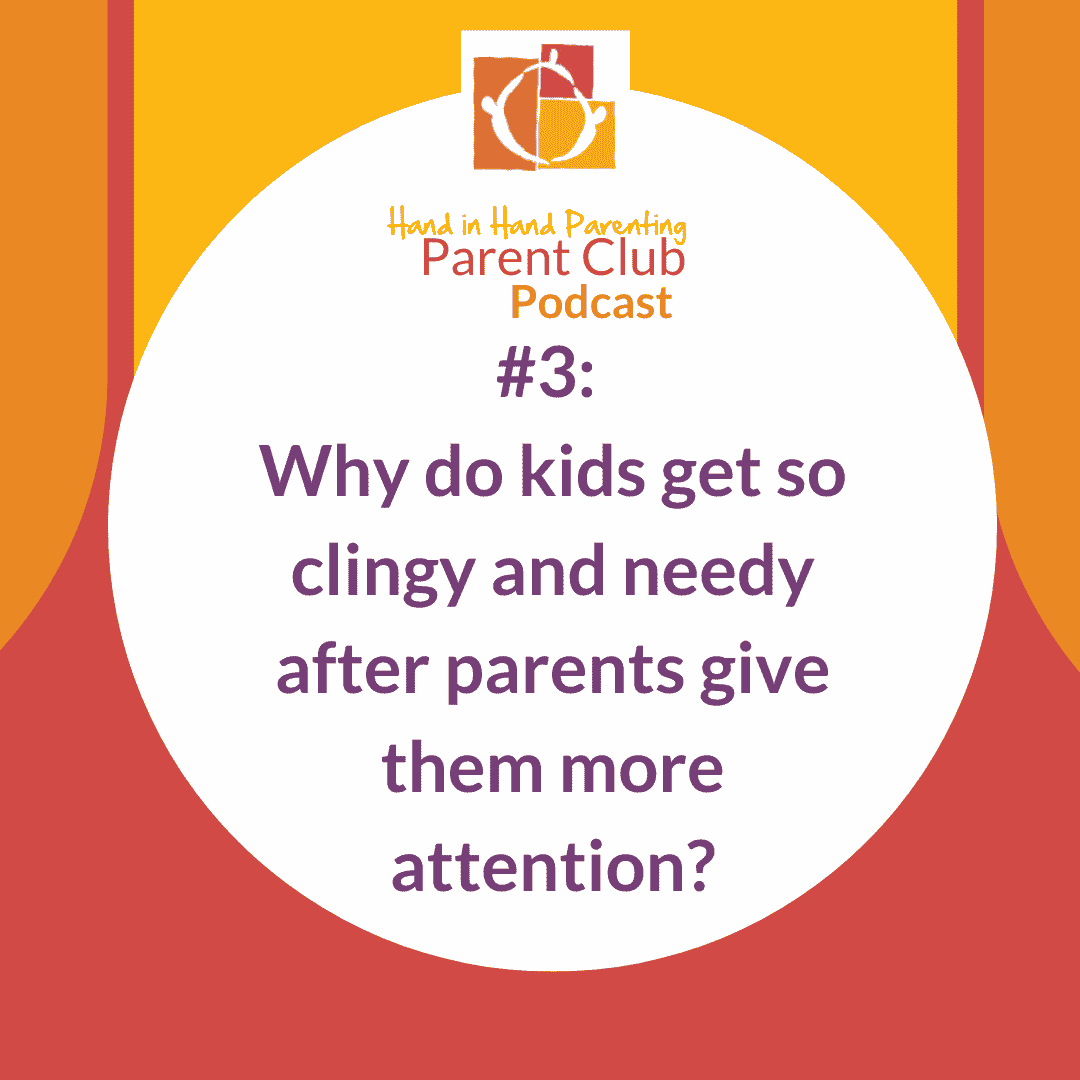Episode Transcript
Speaker 1 00:00:01 Welcome to the hand in hand parent club podcast. I'm Emily Murray, a hand in hand instructor and a mom of
Speaker 0 00:00:06 Two I'm Kathy Gordon, a single adoptive mom of a now young adult son, a hand in hand instructor. And we are both moderators of hand in hand's awesome membership program. The parent club,
Speaker 1 00:00:17 Every week, we'll be answering a parenting question. You'll hear about hand in hand. Parenting's powerful, respectful parenting tools. We'll share how they help you work with your child's feelings, especially when their behavior gets harder. Confusing.
Speaker 0 00:00:29 You can feel good about using these tools. They've brought warmth and connection to our own families and to many thousands of families around the world who are using the hand in hand approach.
Speaker 1 00:00:39 That's why hand in hand and the parent club exist. We're here to support you and your family. So you have more good, sweet fun times together.
Speaker 0 00:00:49 Welcome, welcome. Welcome back. Wonderful parents. The question this week is how can I stop repetitive, annoying behaviors?
Speaker 1 00:00:59 Is there an off switch? Tell me there's an off switch.
Speaker 0 00:01:01 Yes. <laugh> from episode one. Uh, last week's episode, we know that behaviors happen for a reason, and hopefully you did a little bit of detective work around looking for patterns, looking for what might have happened before, or what's the context of this? What, you know, if it's not the cookie, what actually is going on here.
Speaker 1 00:01:26 So, um, last week's article talked about looking for maybe they need connection. Maybe they need information. That's a developing skill. Maybe they're feeling unhappy with themselves. Um, and they just don't have the words to actually express what they're feeling inside, but we wanna shine a light on one other part of this equation, as we're thinking about why, um, off track behaviors happen, why sometimes we get into head to head battles with our children. Um, and that's, what's going on for us as parents in, in this mix and in this interaction. So considering when we're looking at what's causing a behavior, sometimes we need to stop and wonder and get curious about, um, maybe we are, maybe we are overreacting. Um, maybe we are expecting something that's just not possible right in this moment. Um, uh, maybe we are just, um, feeling flustered or overwhelmed because of the many million reasons why a parent can feel flustered and overwhelmed right now. So just shining a light on that idea that our feelings matter too. And our feelings and reactions are a part of the chemistry of, of that moment too. And sometimes we can tinker with that angle, um, when we're working on off track behaviors.
Speaker 0 00:02:41 Yeah. So, um, I have a great story about, uh, checking in with what was going on with me. So, uh, um, what brought me to hand in hand was our bedtime because it was a nightmare. Um, bedtime had been awful for, I don't know, probably a year, a year and a half. And I think my son was about five at the time. Um, and you know, I would make dinner, we would eat dinner and then I would, um, expect him to go, you know, play by himself. And I would, you know, I'd be cleaning up, maybe I'd be reading the newspaper, um, checking emails, you know, it was sort of me time as I was cleaning up. And then it would be like, okay, come on, let's go spend time. And, and, uh, you know, I would expect him to like hop to it right. And
Speaker 1 00:03:30 Very reasonable. It's very reasonable.
Speaker 0 00:03:32 Yeah. And, you know, bath books, lights out, like that's get with the program, you know, and every night it, he would get upset. And I just did not know what to do. I did because you know, every, everybody tells you just, you just need a routine. And as far as I was concerned, we had a good routine. I had my time. And then it was time for you to go to bed so that I could have more me time. Um, and fortunately I had a consultation with Patty and she told me how, um, bedtime is separation. It's the end of connection. And that for children to, um, she was, she taught me how to look at what was going on underneath his upset around bedtime, that he was feeling that disconnection, that he was feeling that separation. So I decided that after eating, we would do special time.
Speaker 0 00:04:32 And then we would do like rough and tumble. We did piggyback ride to the, to the tub and we would do flips on the bed and, you know, then we'd play games, uh, to brush teeth and play games, to put on pajamas and we'd do piggyback rides back to the bed. And then we'd do like a two minute pillow fight and then we'd, we'd do lights out. And he would often just like fall asleep. You know, maybe we would talk a little bit about the day, but he would often just drift off to sleep in a matter of 15 minutes. And what I discovered was that, because I looked at the bigger picture and what was going on underneath his upset, and I put in that connection and that play that, then I got way more me time. Um, because he, because bedtime was so was so much smoother. So that's, you know, for me, like a really good example of looking at like, well, maybe my expectations are a little bit off here in terms of what he's needing. Um, and once I addressed his need for connection and play, we both got what we wanted. Mm.
Speaker 1 00:05:44 I, you know, especially that time of day, um, it can be so hard as a parent when <laugh>, I don't know about you, but I'm looking for that clock out that time clock where I can just punch the card and I'm done and I'm done. Yep. <laugh> um, but your story is a great example of getting ahead of the need meeting the need before it, it blossoms into off track behavior that then kind of spirals because then we're frustrated at them for being off track and we're tapped out cuz it's the end of the day. Um, but getting ahead of the feelings, um, uh, it's such a hand in hand, um, technique and approach. And I love that when we are able to look at this big context of where the behaviors are coming from and why they're happening, then we can, we can tinker with the context and figure out how can I prevent this big eruption of, of feelings, um, based on disconnection.
Speaker 1 00:06:54 Well, you can connect before the disconnection happens. Um, I have a really funny story of my younger daughter. Um, she really has taken to like big, like wrestling match playlisting, uh, opportunities with us. It's one of her favorite things to do because it's big movements. She gets to be loud. She gets to roar. And of course, you know, she bests us every time. She, she always knows that she's going to win. Um, and she's about eight now, but it was a, it was at least a few years ago where the most amazing thing happened. Um, she we've used hand in hand, um, with her since she was born. I found it before, um, you know, her older sister didn't get the benefit of hand in hand since birth, but we've been using hand in hand since she was born. And so we were having a particularly, I don't know, just kind of spiky day where she was, um, just kind of pinballing from one upset to another, nothing was right.
Speaker 1 00:07:59 Everything was wrong, everything was rubbing her the wrong way. And I, I was like kind of getting drawn into it a little bit, but like, you know, just stop, just stop with all of the, um, the grouchiness, but all of a sudden she just threw down whatever was in her hand. And she said, that's it wrestling time right now? And, oh my gosh, this seriousness in her face of like, this is exactly what I need. Um, I know how to, I know how to handle these feelings that are erupting. I handle them with wrestling time with my mom. Um, and I mean, dad is the better wrestling match person, but I was all she had in my <laugh> than she, we went with it. And I, I, I was able to flip a switch in my own self in that moment. Um, you know, I, I could have offered it earlier.
Speaker 1 00:08:55 I could have seen this brewing and offered a wrestling match, but you know, whatever was going on in my head, I, I didn't re I don't really enjoy wrestling <laugh> so I probably didn't feel like it. Um, but the look on her face, I just knew it. I knew I had to rally, I knew I had to do it for her. So I set the timer for five minutes and we went and we did it. And the relief at the other end of that wrestling match was so obvious. She laughed, she got sweaty. Um, she got me, um, she got to be angry, she got to be loud. Um, she got to be aggressive. All of those things that had been brewing in her body for, I don't even know the reason. Um, we, we never got to the reason why she was feeling that way. Um, it was, it was just, you know, the snowball effect of the day, who knows, but by the end of it, oh, the softness, um, the relaxation, it was just so perfect. Um, and she asked for it herself. So children learn that they can get ahead of it too. So when we start using these tools and these strategic ways of bringing connection and bringing laughter and bringing Salinas, um, they learn it, they learn it and they can ask for it.
Speaker 0 00:10:17 Yeah. Awesome. So, awesome. This is a wonderful story. So our one small thing that we're going to ask you to do this week is keep that detective hat on and see if you can get ahead of the behavior by offering connection. Um, along with this podcast is gonna come an article on exactly how to do special time, point by point. Um, so you can offer a few minutes of special time. You can offer some play where you take the less powerful role and you wrestle. Um, but see if you can get out just at the first whiff of that off track behavior, see if you can get out ahead of it by offering a little bit of connection. That's the one small thing we want you to try this week and then come back and tell us how it went
Speaker 1 00:11:06 And then next week, um, we're gonna, we're gonna get into why they sometimes seem so needy when we've already given them so much of our attention. Um, and they it's like, they just are bottomless pits sometimes of need where no amount of connection from us can possibly fill the need that they have. So we're gonna dig into that a little next week.
Speaker 0 00:11:31 Great. Yep. So thanks for being here with us and we'll see you next week. Bye bye.
Speaker 1 00:11:37 Thank you so much for tuning into the hand in hand parent club podcast, please liken subscribe to hear more and to connect with us between these episodes. Come on over to hand in hand parenting.org to join the parent club where you can get coaching classes and live support.
Speaker 0 00:11:50 Come join our vibrant community of parents in the parent club who are committed to getting the support they need to be the parents they wanna become. We'd be honored to support you too. This podcast and the parent club are part of hand in hand parenting, a nonprofit organization that supports parents all over the world. We are here for you when parenting gets hard.


